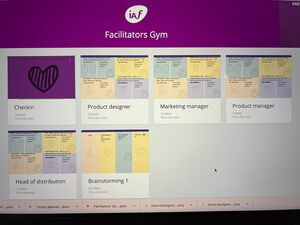TAR CHECK (dt. AKV Methode)

A method to create transparency around team roles and issues
Goal
Obtaining a common, clear picture of the roles in a team
Materials
Instructions
Preparation/Set up:
Provide a room large enough to set up flipcharts according to the number of roles to be discussed and allow participants to walk around between them. (provide appropriate whiteboards online)
Write the official name of each role at the top of the flipchart and devide it into 4 quadrants. The boxes have following titles and space to answer the respective questions:
- ROLE (How do I understand my role on this team? What am I here for?)
- TASKS (What specific tasks do I have to do, what results are expected?)
- AUTHORITY (What authority do I have, what can I decide?)
- RESPONSIBILITY (What is my responsibility on the team? By what will the success of my role be measured?
Process:
Each team member writes their understanding of their role on the 4-panel flipchart.
Give the team enough time to think, take a break and rethink.
For the next step, there are two variations:
Variant for a well established team
In a well-functioning team, after entering one's own role, all participants take turns to go to the other flipcharts and add their views to the four areas of the respective role. This also includes wishes for the role. Then the additions and different perspectives are discussed to achieve a common understanding.
Variant for a less developed or conflict ridden team
When working with a conflict-ridden or less developed team add another second paper to the flipchart. On this second paper the others initially attach their thoughts on the role and post them on cards face down. In a next step the cards will be turned and placed on the first paper. Discrepancies are identified and, depending on the intensity of the conflict, resolved in appropriate steps - such as joint brainstorming, etc.
Outcome
- Better understanding of each role on the team
- Next steps identified to change tasks, authority, responsibility of roles
Online
View a 30-minute recording of Thomas' s demonstration of TAR facilitated during the IAF Facilitators' Gym in October 2022: https://www.youtube.com/watch?v=9JBPx81ogp4&list=PLxbcsN1z1FN6w3E3D5arHEUjbi4UuJEiz&index=9
Attachments
- TAR method pic.jpeg
Background
This is the facilitation version of the classic project management and organisational development tool TAR TASK - AUTHORITY - RESPONSIBILITY.